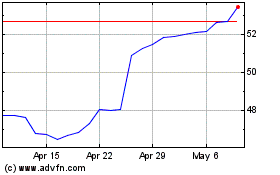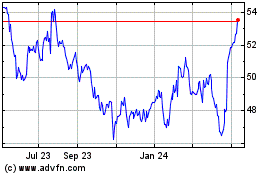By Saabira Chaudhuri
LONDON -- Consumer-products giant Unilever PLC is raising its
U.K. prices for everything from mayonnaise to shampoo after months
of discreet increases amid a Brexit-triggered currency rout that is
threatening Britons' buying power.
The Anglo-Dutch giant said on Thursday it is asking its top
grocery retailers here for price increases on its products, which
include household names such as Hellmann's mayonnaise, Dove soap
and Ben & Jerry's ice cream. It also makes Marmite, a popular
brown, salty spread with a cult following. It cited rising
commodity costs in dollars, which -- coupled with the sharp decline
in the pound -- have raised the cost of imported ingredients.
"The price increases have landed," said Unilever finance chief
Graeme Pitkethly on a call with analysts. Unilever, the world's
second-largest consumer goods maker after Procter & Gamble Co.,
didn't detail its pricing demands, but people familiar with the
discussions said it is asking for hikes of 10% on average,
according to people familiar with the matter.
The demand set the stage for a brief public standoff with Tesco
PLC, Britain's biggest grocer. Tesco on Wednesday pulled Unilever
brands from its website after refusing to accept the demand for
higher prices.
Late Thursday, though, Tesco and Unilever issued statements
saying they had resolved the pricing dispute, without giving
details. Analysts and industry insiders said they expect Unilever
got at least some of the higher prices it was asking for, given the
sharp drop in the pound and how the industry typically operates in
such currency moves.
Unilever also approached J Sainsbury PLC and other British
supermarkets about raising prices by around 10% on average,
according to a person familiar with those conversations. Sainsbury
hasn't yet reached a resolution with Unilever, according to this
person.
The price increase and Unilever's fight with Tesco -- splashed
across the front pages of British newspapers on Thursday and
trending online as "#Marmitegate" -- put the economic stakes of
Brexit for everyday Britons into suddenly high relief. With so many
details of London's planned split with the European Union still
subject to years of negotiations, the largest impact felt so far by
companies and consumers has been the pound's steep drop. The pound
is down roughly 15% against the dollar since the June 23 Brexit
vote.
That has triggered a tourism boom, as visitors enjoy cheaper
hotel stays and shopping. British exporters also have gained as
their goods are more competitive overseas. U.K.-based
multinationals benefit from higher revenue as overseas sales are
converted into sterling.
But for importers, the fall of the pound is painful. Changes in
exchange rates affect input prices almost immediately. The cost of
imported materials for businesses rose by 9.3% in August compared
with a year earlier. Such changes take time to filter through to
consumers. Consumer prices increased less than 1% in the
period.
Still, for many U.K. residents, Sterling's fall is already
causing discomfort. Overseas vacations are more expensive, keeping
more Britons at home. Retail prices of many imported goods, such as
electronic devices, wine and cars, have been ticking higher for
weeks.
Those increases so far have mostly involved discretionary
purchases. With Unilever's latest move, the prospect of higher
prices for staples suddenly looms larger. Sanford C. Bernstein
& Co. equity analyst Bruno Monteyne said the Unilever-Tesco
dispute presaged "inevitable Brexit-induced price inflation."
Last month, the Bank of England noted that retailers were "very
cautious about any increases in prices, given that consumers
remained highly price sensitive, and so the extent and timing of
pass-through would largely depend on competitors' actions,
particularly in food retail."
David Dines, a 56-year-old soccer coach voted in June to remain
in the European Union. Outside a Tesco store in south central
London, tossing an avocado he just bought, he said the prospect of
price fluctuations is "the consequence of Brexit, isn't it? It's
inevitable."
It was unclear whether the higher costs already have been passed
along to consumers in Britain's ultracompetitive grocery market --
or whether they ever will be. U.K. national chains have engaged in
costly price wars for years, fighting each other and a band of
ultra-low-price discounters for market share. If other
consumer-goods giants, such as P&G and Mondelez International
Inc., don't follow suit, shoppers would still enjoy plenty of
options for brands that keep budgets in check.
Still, what Unilever does matters. It commands significant
market share in a number of consumer-product sectors in Britain. It
enjoys a 37% share of Britain's ice cream market, for instance, and
21% of its table sauce market, according to market researcher
Euromonitor International.
Some analysts questioned the timing of Unilever's move. Brexit
and the weak pound aside, it comes as the company struggles with
lifting sales volume globally. On Thursday, Unilever posted
third-quarter sales growth on an underlying basis -- which strips
out the impact of acquisitions, disposals and exchange-rate changes
-- of 3.2%, down from a 5.7% gain in the same period a year
earlier. The price increases the company has pushed through so far
"are substantially less than we would need to cover the impact on
our own profitability," Mr. Pitkethly, the finance chief, said. He
said U.K. sales make up about 5% of Unilever global sales.
He said Unilever has incurred EUR600 million ($662 million) in
higher costs this year tied to currency devaluation, excluding the
effect from the pound's decline against other currencies.
Unilever's hedging arrangements typically protect it between four
and six months out, however, and the company may start seeing the
effect of higher sterling costs later this month.
Write to Saabira Chaudhuri at saabira.chaudhuri@wsj.com
(END) Dow Jones Newswires
October 13, 2016 15:05 ET (19:05 GMT)
Copyright (c) 2016 Dow Jones & Company, Inc.
Unilever (NYSE:UL)
Historical Stock Chart
From Mar 2024 to Apr 2024

Unilever (NYSE:UL)
Historical Stock Chart
From Apr 2023 to Apr 2024
